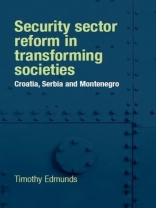This book is about the relationship between societies and their
security forces at times of great political and societal change. It uses the
experiences of Croatia, Serbia and Montenegro to examine the control,
management and reform of armed forces, police and intelligence agencies in
the aftermath of conflict and authoritarianism. The book assesses the theory
and practice of security sector reform programmes in the context of Europe
and the Western Balkans, the relationship between security sector reform and
normative international policy more generally, and the broader dynamics of
post-conflict and post-authoritarian transformation. In so doing it
addresses two underlying questions. First, how and in what ways does reform
in the security sector interrelate with processes of domestic political
and societal transformation, particularly democratisation. Second, how and
in what ways do these processes relate and respond to internationally-driven
efforts to promote a particular type of security sector reform as a
component of wider peacebuilding and democracy promotion strategies.
Table of Content
1. Introduction: security sector reform in transforming societies
Part I: security sector reform
2. Security sector reform: a framework for analysis
Part II: the political level
3. Security sector reform at the political level: Croatia
4. Security sector reform at the political level: Serbia-Montenegro
Part III: the organisational level
5. Security sector reform at the organisational level: Croatia
6. Security sector reform at the organisational level: Serbia-Montenegro
Part IV: the international level
7. Security sector reform at the international level: Croatia
8. Security sector reform at the international level: Serbia-Montenegro
Part V: conclusion
9. Conclusion: security sector reform in comparative context
About the author
Timothy Edmunds is Senior Lecturer in the Department of Politics at the University of Bristol












